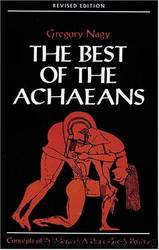The Best of the Achaeans: Concepts of the Hero in Archaic Greek Poetry by Gregory Nagy

Author:Gregory Nagy [Nagy, Gregory]
Language: eng
Format: epub
Tags: Homer - Characters - Heroes, Ancient, History and Criticism, Epic Poetry; Greek - History and Criticism, Poetry, Heroes in Literature, General, Literary Criticism, Ancient & Classical, Epic Poetry; Greek, History
ISBN: 9780801860157
Google: SXRfAAAAMAAJ
Publisher: Johns Hopkins University Press
Published: 1979-01-02T05:00:00+00:00
kuklou d' exeptan barupentheos argaleoio.
I rushed out of the woeful kuklos of heavy penthos [grief].
Whether we translate kuklos abstractly as "circle" or concretely as "wheel," it clearly applies here to the human condition (Zuntz, pp. 320-322). Note that the Pythagorean word for "reincarnation" is anakuklôsis (p. 99.30DK; cf. Zuntz, p. 336). For another instance where kuklos designates the cyclic nature of man's existence, cf. Herodotus 1.207.2: if Cyrus recognizes that he is a mortal rather than an immortal, says Croesus, then he should accept the teaching "that there is a kuklos of human affairs" (ekeino prôton mathe hôs kuklos tôn anthrôpêiôn esti prêgmatôn). On a synchronic level, the immediate sense here is "wheel of fortune," but the ultimate context is still the predicament of mortality. Note that the persona of the dead man in the Thurian gold leaf A1 declares that he has become, after death, part of the olbion genos 'blessed breed' of immortals (Zuntz, p. 301, line 3; cf. also gold leaves A2 and A3) and that he will henceforth be addressed as olbie kai makariste 'holy and blessed' (line 8). Cf. olbioi hêrôes 'blessed heroes' (W&D 172), describing the immortalized fourth genos ('generation, breed') of mankind, who abide en makarôn nêsoisi 'on the Isles of the Blessed [makares]' (W&D 171). For more on the Thurian gold leaves, see Ch.10§20n5.
§31n1. For the inherited connections of the thrênos as a genre with the obsolescent institution of ancestor worship even in the classical period, see Ch.6§28: the cult of heroes in the polis evolved at least partly from the worship of ancestors in the genos 'clan'. Note that Simonides fr. 523P, which tells how the hêmitheoi (line 2) are destined not to have a bios 'lifespan' that is aphthitos'unfailing' (line 3), is an excerpt from a thrênos (Stobaeus 4.34.14). From the standpoint of the comparative method, the themes of the thrênos include elements archaic enough to be of Indo-European pedigree (see Vian 1963.118).
§31n2. The passage is quoted by Plato Meno 81b to illustrate a traditional ideology preserved in social circles that he describes as well-versed in sacral lore. For a correlation of the ideology in this thrênos with the ideology of the Thurian gold leaves, cf. Zuntz 1971.313. I draw special attention to the words poinâ 'compensation' and penthos'grief' in the Pindaric fragment. The function of the latter word as a formal mark of lamentation has already been examined in detail (Ch.6); we have also seen it characterize the kuklos of life in the Thurian gold leaf A1: barupentheos 'of heavy penthos' (see §30n2). As for the former word, it figures prominently in the Thurian gold leaves A2 and A3 (Zuntz, pp. 303 and 305, line 4):
Download
This site does not store any files on its server. We only index and link to content provided by other sites. Please contact the content providers to delete copyright contents if any and email us, we'll remove relevant links or contents immediately.
4 3 2 1: A Novel by Paul Auster(12393)
The handmaid's tale by Margaret Atwood(7767)
Giovanni's Room by James Baldwin(7346)
Asking the Right Questions: A Guide to Critical Thinking by M. Neil Browne & Stuart M. Keeley(5775)
Big Magic: Creative Living Beyond Fear by Elizabeth Gilbert(5774)
Ego Is the Enemy by Ryan Holiday(5450)
The Body: A Guide for Occupants by Bill Bryson(5098)
On Writing A Memoir of the Craft by Stephen King(4944)
Ken Follett - World without end by Ken Follett(4734)
Adulting by Kelly Williams Brown(4574)
Bluets by Maggie Nelson(4559)
Eat That Frog! by Brian Tracy(4541)
Guilty Pleasures by Laurell K Hamilton(4450)
The Poetry of Pablo Neruda by Pablo Neruda(4109)
Alive: The Story of the Andes Survivors by Piers Paul Read(4033)
White Noise - A Novel by Don DeLillo(4012)
Fingerprints of the Gods by Graham Hancock(4004)
The Book of Joy by Dalai Lama(3986)
The Bookshop by Penelope Fitzgerald(3854)
